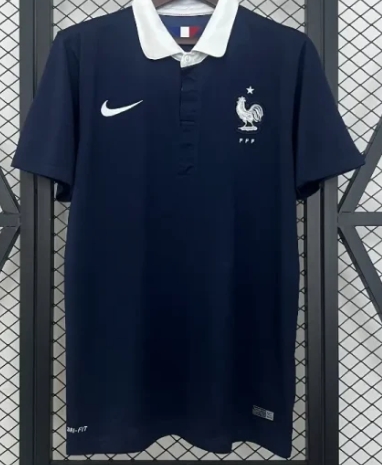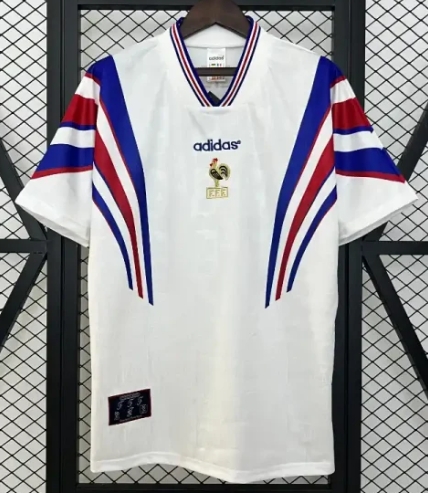

France’s national soccer team, known as "Les Bleus" (The Blues), boasts a rich and illustrious history in international football that spans over a century. From its creation in the early 20th century to its prominent position as one of the world’s top soccer nations, France has seen remarkable successes, disappointments, and transformations. The journey of French soccer is a narrative of talent, teamwork, and enduring passion for the beautiful game.
france soccer jerseys football YUPOO china B2B2C Wholesale Supplier Branded national france soccer jerseys retro shirts, join us on whatsapp | Yupoo fashion national france soccer jerseys players jerseys football retro jerseys reseller online store , Yupoo jerseys Replica top version for yupoo wholesale drop shipping jerseys to worldwide.
Football in France began to take shape in the late 19th century. The French Football Federation (FFF) was established in 1919, largely aimed at organizing and promoting the sport in the country. Before this formalization, France participated in various international matches, often struggling against established footballing nations. The first official match for the French national team occurred on April 1, 1904, against Belgium, ending in a 3-3 draw, marking the inception of France’s journey in international football.
In the following years, France participated in several international competitions, including the first-ever FIFA World Cup held in 1930 in Uruguay. The team was among the 13 nations participating but did not progress beyond the group stage, losing to Argentina 1-0 in their opening match. The 1934 World Cup allowed France another chance to showcase their talent, but they were eliminated in the first round once again.
Despite early disappointments, France's soccer scene continued to grow, with clubs and local talent emerging as beacons of hope. The 1940s saw challenges, primarily due to World War II, which disrupted international play and soccer development in France.
The post-war era led to a revamping of French football, and by the 1950s, the national team began to showcase its capabilities. France competed in the 1954 FIFA World Cup held in Switzerland, where they reached the quarterfinals, demonstrating marked improvement and competitiveness on the world stage.
The emergence of legendary players like Just Fontaine during this period invigorated the French squad. Fontaine became known for his goal-scoring prowess and would later set a record for the most goals scored in a single World Cup tournament, netting 13 goals in the 1958 World Cup in Sweden. Despite this impressive individual feat, France finished third, losing in the semifinals to Brazil.
The 1980s marked the beginning of a golden era for French football. The national team, now managed by legendary coach Michel Platini, reached the semifinals of the 1982 FIFA World Cup held in Spain. Their match against West Germany is still considered one of the most iconic games in World Cup history, marked by dramatic comebacks and penalty shootouts. However, France finished fourth in the tournament as they reflected on their performances.
In 1984, France hosted the UEFA European Championship and showcased a stellar performance, winning the tournament. Led by Platini’s extraordinary skill and vision, France defeated Spain 2-0 in the final, securing their first major international trophy. This victory marked a turning point, establishing France as a formidable soccer nation.
The 1990s began with high hopes but brought challenges. The national team failed to qualify for the 1994 FIFA World Cup in the USA, which shocked the nation. However, they regrouped and recovered, seeing the emergence of talented players such as Zinedine Zidane, Thierry Henry, and Lilian Thuram.
In 1996, France reached the semifinals of the UEFA Euro held in England, further reaffirming their talent. The national team's fortunes improved as they moved towards the 1998 FIFA World Cup, which they would host.
The 1998 FIFA World Cup marked a historic moment for French soccer. Under the management of Aimé Jacquet, France fielded a talented roster featuring players like Zidane, Didier Deschamps, and Patrick Vieira. The team performed remarkably throughout the tournament, culminating in a dramatic final against Brazil.
On July 12, 1998, France claimed a 3-0 victory against Brazil at the Stade de France, with Zidane scoring two headers from corner kicks. This victory not only secured France's first World Cup title but also solidified their status as a dominant force in international football. The triumph resonated deeply with the French people, uniting the nation and igniting a passionate love for the beautiful game.
Following their World Cup victory, France continued its winning momentum, competing in the UEFA Euro 2000 held in Belgium and the Netherlands. The French team delivered stunning performances, defeating Italy in the final with a dramatic golden goal from David Trezeguet. This success marked France’s second major international trophy in two years, further solidifying their